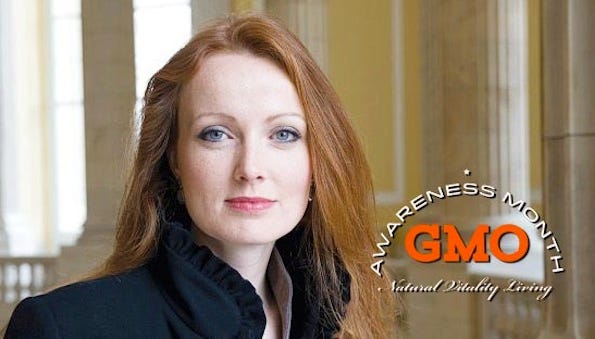Inside the battle for GMO labelingInside the battle for GMO labeling
Natural Vitality Living offers this exclusive interview with Elizabeth Kucinich, experienced advocate and government affairs professional, policy director with the Center for Food Safety, and executive producer of "GMO OMG."
October 9, 2013

 At Natural Vitality Living, we’re celebrating GMO Awareness month with a weekly feature dedicated to the subject. This week we offer this exclusive interview with Elizabeth Kucinich. An experienced advocate and government affairs professional, Kucinich is the Policy Director with the Center for Food Safety in Washington, DC, where she is at the front lines of the battle for GMO labeling legislation. Kucinich is the executive producer ofGMO OMG, a documentary exploring genetic engineering in agriculture and food production (www.GMOfilm.com), which premiered at the Berlin International Film Festival in February 2013.
At Natural Vitality Living, we’re celebrating GMO Awareness month with a weekly feature dedicated to the subject. This week we offer this exclusive interview with Elizabeth Kucinich. An experienced advocate and government affairs professional, Kucinich is the Policy Director with the Center for Food Safety in Washington, DC, where she is at the front lines of the battle for GMO labeling legislation. Kucinich is the executive producer ofGMO OMG, a documentary exploring genetic engineering in agriculture and food production (www.GMOfilm.com), which premiered at the Berlin International Film Festival in February 2013.
Want more on the basics before diving in? Visit the NVL Guide to Understanding GMOs.
Natural Vitality Living: What’s at the forefront of your mind right now in terms of GMOs?
Elizabeth Kucinich: The biggest issue right now on everyone’s mind is the fall ballot initiative to label GMOs in Washington State. We’re really working to make that a success.
NVL: How have the past 12 months been for the GMO labeling campaign?
EK: The California ballot issue to label GMOs last year enabled an enormous conversation to happen across the country. Millions of dollars were spent on campaigns on both sides, and even though it didn’t pass, it got the issue out. Since then we have seen things grow in leaps and bounds, and we now have 26 states with various kinds of pending legislation; so having half of the nation really pushing for this on the state level is a huge move forward. And hopefully we will build that into an ultimate success in November in Washington State.
NVL: Is GMO labeling inevitable?
EK: It will happen. The question is will it happen state by state and then on to DC, or will it come to a national conversation and then to DC quicker than we think? I feel that the states have done a tremendous job in raising the profile of this issue and helping legislators at both state and federal levels. Washington, DC, will most likely soon become a place where these conversations are going to be happening, because Big Food and Big Ag are not going to want to deal with individual states. So, we on the other side of this issue will have to bring our conversation to places like the FDA to make sure that the standards in labeling that potentially do arise are very meaningful and not just greenwashing or healthwashing.
NVL: The Senate recently killed the Monsanto Protection Act that would have allowed biotechnology companies to sell genetically modified seeds even if a court blocks them. How big of a victory is this?
EK: It’s a massive deal. And it’s really come about because there was such tremendous backlash—certain offices definitely felt the brunt of phone calls, and quite honestly just got very scared and realized, “My goodness, these people are serious”; this is a movement—this is not just a fringe issue; this is mainstream. So when it became obvious that the Senate was going to have the power to keep it in or remove it, a lot of forceful phone calls came from literally millions of people who just said we are not going to have this. It’s really fantastic, and it’s actually emblematic of just how strong the movement is.
NVL: What are the primary obstacles to labeling at the forefront of your mind now?
EK: I think it’s the methodology of the other side and the mixed messaging and trying to lure people from every different level that there is. There are so many questions about the pros and cons of this type of agriculture when in reality labeling is about transparency and our right to know, and the other stuff shouldn’t really matter. It should be about whether or not consumers have the right to know what they’re eating, or do these companies have the right to keep us in the dark?
NVL: From your vantage point in the GMO labeling movement, do you feel optimistic about our country’s agricultural future?
EK: There’s a tremendous movement, there are passionate people, and there are more and more people joining this cause. For me, I look beyond labeling. Of course, I want labeling and I want everyone to have the right to know, but ultimately it’s a lot more than just labeling. There are millions of chemicals in use polluting our crops and streams, and labeling will help people make informed decisions; but ultimately we need to change our entire approach to agriculture.
NVL: What can the average consumer do to promote a GMO labeling mandate?
EK: Be a voice wherever you are—on social networks, talking to the person next to you at the grocery store. What I love about food activism is that it’s immediate: where we put our food dollars is really determining the future of how food is produced. Buying organic is vital. I also want to stress the tone you take with people when discussing this issue. Walls can come up quickly, so it’s important to tread lightly when discussing GMOs.
You May Also Like



